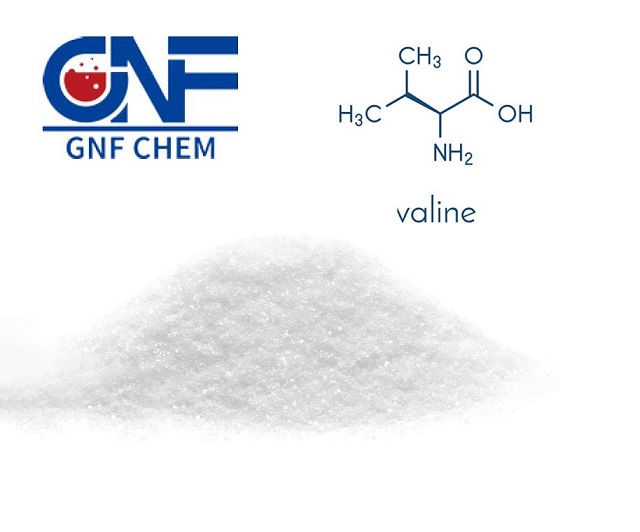-
Make a Call : +86 551 63500087
-
Get A Estimate : sales@gnfchem.com
What Are You Looking For?
What Are You Looking For?
Make a Call : +86 551 63500087
Get A Estimate : sales@gnfchem.com

L-Valine
Aug 07, 2024L-Valine- Uses
L-Valine is an amino acids that is widely found in living organisms and plays an important role in many biological processes. Some of the major uses of L-Valine are listed below:
1. Protein synthesis: L-Valine is one of the building blocks of proteins and is involved in the process of protein synthesis, which is necessary for normal cell growth and development.
2. Energy supply: L-Valine is an amino acid that serves as one of the sources of energy and is involved in energy production processes such as the tricarboxylic acid cycle and oxidative phosphorylation.
3. Brain Function: L-Valine is one of the precursors for the synthesis of the neurotransmitter glutamate, which is converted to glutamate in the brain and then involved in the neurotransmission process, which is essential for the normal functioning of the brain.
5. Immune system: L-Valine has a regulatory effect on the immune system, promoting the proliferation and activation of lymphocytes and improving immune function.
Overall, L-Valine plays a variety of important roles in the body, including protein synthesis, energy supply, brain function, cholesterol regulation and immune system regulation.
L-Valine is a naturally occurring amino acid that can be obtained by a variety of synthetic methods.
One commonly used synthetic method is the synthesis of L-valine via the metabolic pathway of nucleotides. Hydrogen transferase converts α-ketoglutarate to L-aminoadipic acid. Then, aminotransferase action converts L-aminoadipic acid to L-valine.
Another method of synthesising L-valine is through chemical synthesis. This process involves several steps as follows:
1. a reaction is carried out using glutaraldehyde and thiourea to produce valine acid.
2. The valeric acid is reacted with ammonia to produce an amino acid derivative of L-valine.
3. During the synthesis, the rate and selectivity of the reaction is controlled using suitable catalysts and solvents.
4. Process steps such as crystallisation, infusion and drying are used to obtain L-valine with high purity.
These are two common methods for synthesising L-valine, according to the actual need, you can choose the suitable method for synthesis.
L-Valine - Preparation Method:
L-Valine is a natural amino acid that can be prepared by different methods. The following is one of the commonly used methods of preparation:
Extraction from natural substances containing valine. For example, valine can be extracted from proteins. Next, it can be synthesised. A common method of synthesis is by optical separation, i.e., obtaining a mixture from a natural substance and then chemically separating the non-target enantiomers to obtain the desired target product. This process usually involves catalysts and organic solvents and requires temperature and pH control.
Alternatively, L-valine can be produced by fermentation methods. This usually involves the use of appropriate strains of bacteria, cultured under suitable conditions. The strains are usually specifically selected to improve yield and purity.
L-Valine - Essential Amino Acid
L-valine is an essential amino acid also known as L-leucine.Essential amino acids cannot be synthesised by the body on its own and must be ingested through food.L-valine is an amino acid found in proteins and it performs a number of important functions in the body.L-valine is one of the building blocks of proteins and it is utilised to synthesise new proteins, maintain normal body growth and repair tissues. L-valine is also involved in regulating protein metabolism and synthesis in the body, as well as regulating the metabolism of fats and sugars.L-valine also plays an important role in muscles by increasing muscle synthesis and improving physical strength and endurance. Adequate intake of L-valine is important for maintaining good health, supporting exercise, and promoting muscle growth.
L-Valine - Toxicity and Use Limits
L-Valine is an amino acid that is one of the nutrients required by the human body. According to scientific studies, L-Valine is relatively safe in the human body with no reported toxicity or carcinogenicity. Like any other chemical, overuse may lead to side effects. This is because high doses of the supplement may cause reactions such as gastrointestinal upset, diarrhoea or headaches in some people.
GNFCHEM is professional Food Additives manufacturer, please follows us and get more products catalogue and price!

Hi! Click one of our members below to chat on